
Greenock is a town and administrative centre in the Inverclyde council area in Scotland, United Kingdom and a former burgh within the historic county of Renfrewshire, located in the west central Lowlands of Scotland. It forms part of a contiguous urban area with Gourock to the west and Port Glasgow to the east.

Port Glasgow is the second-largest town in the Inverclyde council area of Scotland. The population according to the 1991 census for Port Glasgow was 19,426 persons and in the 2001 census was 16,617 persons. The most recent census in 2011 states that the population has declined to 15,414. It is located immediately to the east of Greenock and was previously a burgh in the county of Renfrewshire.

Renfrewshire or the County of Renfrew is a historic county, registration county and lieutenancy area in the west central Lowlands of Scotland. The lieutenancy area covers the three modern council areas of Inverclyde, Renfrewshire and East Renfrewshire, and this area is occasionally termed Greater Renfrewshire to distinguish it from the modern council area called Renfrewshire. The historic county additionally included territory on the south-western edge of Glasgow which was gradually transferred to the administrative area of the city as it grew.
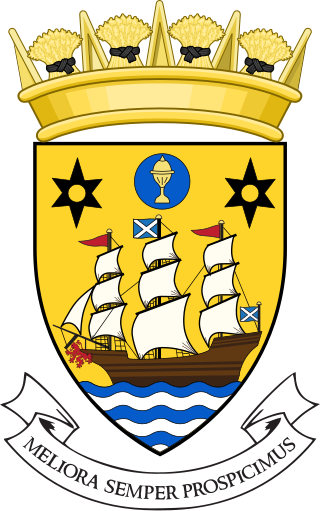
Inverclyde Council is one of the 32 local authorities of Scotland, covering the Inverclyde council area. In its current form the council was created in 1996, replacing the previous Inverclyde District Council which existed from 1975 to 1996.
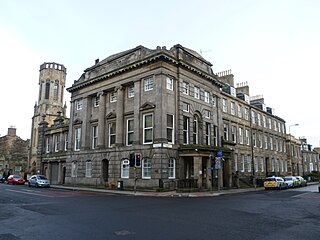
The Old Town Hall is a municipal building in Queen Charlotte Street, Leith, Scotland. The old town hall, which was the meeting place of Leith Burgh Council, is now used as a police station. It is a Category A listed building.
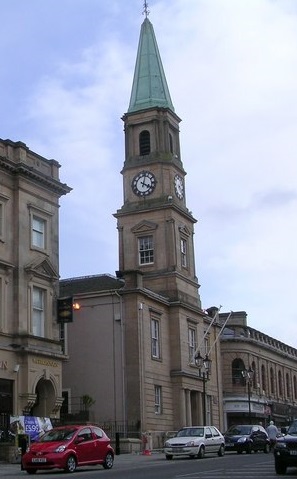
Airdie Town House is a municipal building in Bank Street, Airdrie, North Lanarkshire, Scotland. The town house, which was the headquarters of Airdrie Burgh Council, is a Category B listed building.
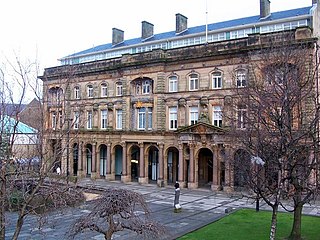
Greenock Municipal Buildings is a municipal structure in Clyde Square, Greenock, Scotland. The municipal buildings, which are the headquarters of Inverclyde Council, are Category A listed.

Stirling Tolbooth is a municipal building in Broad Street, Stirling, Scotland. The structure, which was the original meeting place of Stirling Burgh Council, is a Category A listed building.
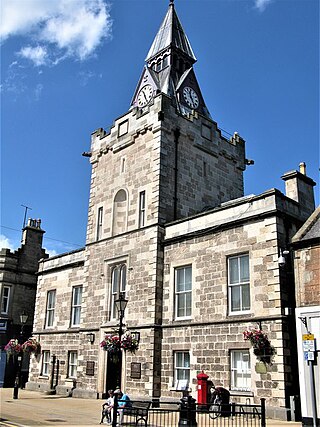
Nairn Town and County Buildings is a municipal structure in the High Street, Nairn, Highland, Scotland. The structure, which is used as a service point for The Highland Council, is a Category B listed building.

Cupar Burgh Chambers is a municipal structure in St Catherine Street in Cupar, Fife, Scotland. The building, which was the meeting place of Cupar Burgh Council, is a Category B listed building.
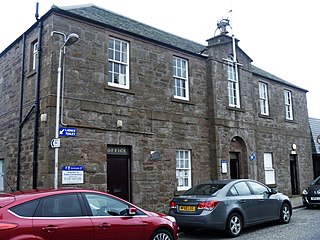
Inverbervie Town House is a municipal structure in Church Street in Inverbervie, Aberdeenshire, Scotland. The structure, which is primarily used as a public library, is a Category B listed building.

Campbeltown Town Hall is a municipal structure in Main Street in Campbeltown, Argyll and Bute, Scotland. The structure, which is used as a community events venue, is a Category B listed building.

Annan Town Hall is a municipal building in the High Street in Annan, Dumfries and Galloway, Scotland. The structure, which accommodates the local library and is also used as a venue for the provision of local services, is a Category B listed building.

Lochmaben Town Hall is a municipal building in the High Street in Lochmaben, Dumfries and Galloway, Scotland. The structure, which accommodates a library and a local customer services point, is a Category A listed building.
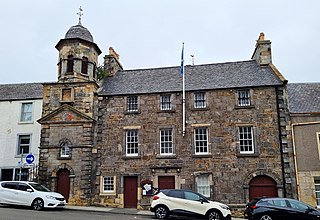
Inverkeithing Town House is a municipal building in the Townhall Street, Inverkeithing, Fife, Scotland. The structure, which is used as a base by members of the local community council, is a Category A listed building.

Dysart Tolbooth and Town House is a municipal building in the High Street, Dysart, Fife, Scotland. The structure, which was comprehensively restored in 2009, is a Category A listed building.

Newburgh Town House is a municipal building in the High Street in Newburgh, Fife, Scotland. The structure, which is used as a series of artists' studios, is a Category B listed building.

Burntisland Burgh Chambers is a municipal structure in the High Street, Burntisland, Fife, Scotland. The building, which is the meeting place of the Burntisland Community Council, is a Category B listed building.
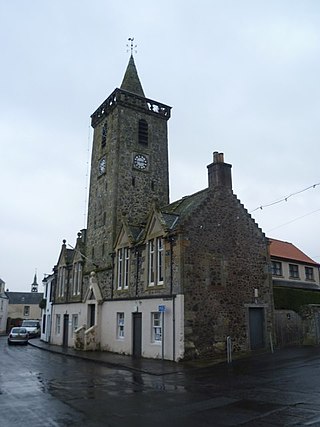
Auchtermuchty Town House is a municipal structure in the High Street, Auchtermuchty, Fife, Scotland. The structure, which accommodates the local public library, is a Category B listed building.
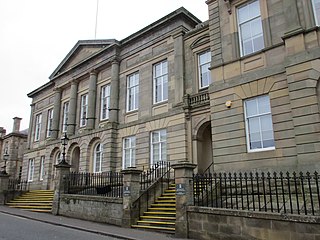
Lanark Sheriff Court is a judicial building in Hope Street, Lanark, South Lanarkshire, Scotland. The building, which continues to serve as the local courthouse, is a Category B listed building.





















